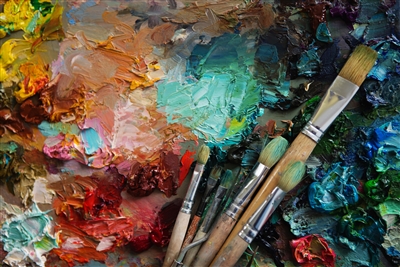Why study art?

In our technology driven economy, many people might wonder at the purpose of studying art. What does a student have to gain by studying such a subject, and would their time be better spent taking courses such as mathematics or the sciences?
First of all one set of studies doesn`t have to come at the expense of another. Maths and science are part of the national curriculum, so all students will have spent a number of years studying them. For this reason alone it will be advantageous to study art, as it will augment your education, filling a gap and broadening your outlook.
The study of art is also the study of history, and you will find yourself connecting with culture in new and interesting ways. To learn about the renaissance is to learn about the Medici`s, and European politics around the turn of the 16th century - while to study Pablo Picasso`s Guernica, just one of his paintings, will be to learn about the Spanish Civil War. Art is so often a reaction and commentary on current events - just look at Banksy`s work, and the satirical imagery in Punch magazine, which helped to coin the term `cartoon`.
Perhaps the most important reason to study art is that it stimulates the imagination, and makes you more observant to the beauty in every day life. Leonardo da Vinci himself said, `Painting embraces all the ten functions of the eye - that is to say, darkness, light, body and colour, shape and location, distance and closeness, motion and rest.`
If you study painting you will also enhance your fine motor skills, improve your hand-eye coordination, develop your lateral thinking, while boosting your complex analysis and critical thinking skills.
Of course your don`t have to study art with the intention of becoming a professional artist, and possessing an artistic background will likely help you in many unexpected ways. Whatever career you go into, your artistic training will help present material in a way that is aesthetically pleasing.
Painting, drawing, sculpture - theses are all activities that are well known to help reduce stress levels. Even if they are simply being pursued as a hobby, having a creative project that is unconnected to your academic studies or vocational work can be hugely rewarding, and a welcome refuge from the travails of day to day life.
The internet has created a massive opportunity for all kinds of digital creators, from freelance photoshop artists, to many other forms of multimedia designers. Every business today has a website which needs to be designed with aesthetics in mind. A background in art will also help graphic designers, app designers, video producers, digital illustrators, animation artists, game designers, multimedia artists, and online publishers. A study conducted by the Australia Council for the Arts who analysed the national census data, found that the number of creative professionals in roles within other professions - for example graphic designers working in commercial posts - almost doubled between 1996 and 2006.
In 2018 the UK creative jobs market grew by 1.6%, compared to a the entire UK job market`s measly 0.8% growth. Over a longer period the growth in this sector is even more staggering: a 30.6% rise in comparison to a UK average of 10.1% in the 2011 - 2018 interval. Creation and innovation drives the economy, and it is creative and artistic people who are able to `think outside the box` and develop innovative products and create novel businesses. The demand for creative individuals will surely only increase in the future, and having studied art will ensure you have a significant advantage.

 Add a Comment
Add a Comment